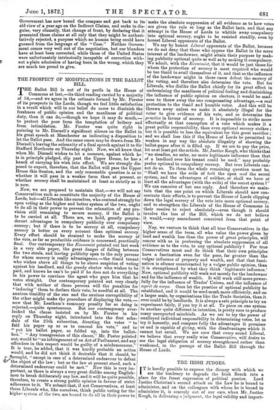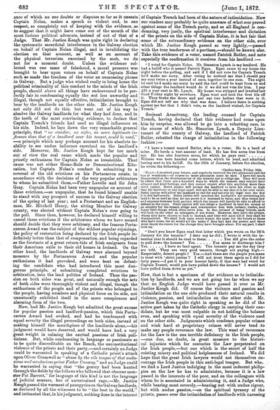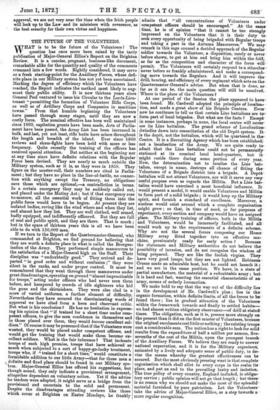THE IRISH JUDGES.
T is hardly possible to express the dismay with which we I see the tendency to degrade the Irish Bench into a place for the freest expression of political passion. Lord Justice Christian's second attack on the Law he is bound to administer, and on the colleagues with whom he is bound to administer it, is scarcely out of our ears, when Mr. Justice Keogh, in delivering a judgment, the legal validity and import- ance of which no one doubts or disputes so far as it unseats Captain Nolan, makes a speech so violent and, in one respect, so completely out of keeping with the evidence, as to suggest that it might have come out of the mouth of the most furious political advocate, instead of out of that of a Judge. That Mr. Justice Keogh was quite right in declaring the systematic sacerdotal interference in the Galway election on behalf of Captain Nolan illegal, and in invalidating the election on that account, as well as on account of the physical terrorism exercised by the mob, we do not for a moment doubt. Unless the evidence col- lected was one mass of falsehood, a moral pressure was brought to bear upon voters on behalf of Captain Nolan such as made the freedom of the voter an unmeaning phrase in Galway. But a judge who wished really to bring home the political criminality of this conduct to the minds of the Irish people, should above all things have endeavoured to be per- fectly fair in condemning equally the not less unworthy and illegal, though not equally effective, intimidation brought to bear by the landlords on the other side. Mr. Justice Keogh not only did not do this, but went out of his way to absolve the Galway landlords for what they had done, and in the teeth of the most convincing evidence, to declare that Captain Trench's friends had used no illegal influences on his side. Indeed, he lays down the very remarkable general principle, that " no steadier, no safer, no more legitimate in- fluence than that of a landlord over his tenant, could be used," —a principle which may perhaps account for his absolute in- ability to see undue influence exercised on the landlord's
side. Moreover, Mr. Justice Keogh kept far too much out of view the real cause which made the popular and priestly enthusiasm for Captain Nolan so irresistible. That cause was not either Home-Rule or Denominational Edu- cation, but Captain Nolan's conduct in submitting to a reversal of the old evictions on his Portacarron estate, in accordance with the decisions of the very popular arbitrators to whom he submitted them,—Father Lavelle and Sir John Gray. Captain Nolan had been very unpopular on account of these evictions,—so unpopular, that he found himself unable to stand with any prospect of success in the Galway election of the spring of last year ; and a Protestant and an English- man, Mr. Mitchell Henry, the sitting Member for Galway county, was elected without Captain Nolan's ever going to the poll. Since then, however, he declared himself willing to cancel these evictions if the arbitrators whom we have named should decide that they were arbitrary, and the famous Porta- carron Award was the subject of the wildest popular rejoicings, the policy of restoration being declared by the Irish people in- definitely better than that of compensation, and being regarded as the foretaste of a great return-tide of Irish emigrants from their American exile to their old homes in Ireland. On the other hand, the landlords of Galway were alarmed beyond measure by the Portacarron Award and the popular enthusiasm it had provoked, and were bent on defeat- ing the candidate who had introduced this most dan- gerous principle, of submitting completed evictions to arbitration, into the land politics of Ireland. Thus the pas- sion on both sides was great, and naturally enough the acts of both sides were thoroughly violent and illegal, though the enthusiasm of the people and of the priests who belonged to the people, having numbers and physical force on its side, not unnaturally exhibited itself in the more conspicuous and alarming form of the two.
Now, had Mr. Justice Keogh but admitted the great excuse for popular passion and landlord-passion, which this Porta- carron Award had evoked, and had he -condemned with equal severity the illegal proceedings on both sides, instead of making himself the mouthpiece of the landlords alone,—his judgment would have deserved, and would have had, a very great weight in calming the excited passions of Irish poli- ticians. But, while condemning in language so passionate as to be quite discreditable on the Bench, the unconstitutional violence of the priests and their party,—and certainly no Judge could be warranted in speaking of a Catholic priest's attack upon Oliver Cromwell as "abuse by the vile tongue of that auda- cious and mendacious priest Father Conway ," and no Judge could be warranted in saying that "the gentry had been hunted through the fields by the fellows who followed that obscene mon- ster Pat Barrett," for language of this kind is not the language of judicial censure, but of unrestrained rage,—Mr. Justice Keogh passed the warmest of panegyrics on the Galway landlords, as declared by all the witnesses to be "the best in the world," and intimated that, in his judgment, nothing done in the interest of Captain Trench had been of the nature of intimidation. Now our readers may probably be quite unaware of what was proved against some of the Trench party, and as all England is con- demning, very justly, the spiritual interference and dictation of the priests on the side of Captain Nolan, it is but fair that some of the extraordinary evidence on the other side, over which Mr. Justice Keogh passed so very lightly,—passed with the true tenderness of a partisan,—should be known also. Take this evidence of a voter, named Patrick Butler, and note especially the confirmation it receives from his landlord :— "I voted for Captain Nolan. Mr. Staunton Lynch is my landlord. He had a bailiff who is named Patrick Egan. Egan came to my house the night before the polling, and said if I did not vote for Captain Trench he'd make me sorry. After voting he noticed me that I should pay my rent twice a year instead of once, together in one sum. The night he said he'd make me sorry he said the turf could be kept from us and other things the landlord would do if we did not vote for him. I pay £21 a year rent to Mr. Lynch. My house was stripped and levelled last Good Friday night by crowbars. Egan went and took the first tile off it. They broke the doors and put out two heifers that were in it. Egan did not tell me why that was done. I believe there is nothing against me but that I didn't vote, as the landlord wished, for Captain Trench."
Serjeant Armstrong, the leading counsel for Captain Trench, having declared that this evidence had come upon him by surprise, was allowed to go into a rebutting case, in the course of which Mr. Staunton Lynch, a Deputy Lieu- tenant of the county of Galway, the landlord of Patrick Butler, rebutted the charge of intimidation in the following fashion ;-
"I have a tenant named Butler, who is a voter. He is a herd of mine. He herds a vast amount of land. He has five acres free from me. He has also fourteen acres for which he pays rent.' Witness was here handed some letters, which he read, and admitted having sent to his bailiff. On the 26th of January, before the election, he wrote the following:—
'Cheltenham, Friday, 26th.
`EGAN—i received your letters, and regularly received the two pheasants and the box of woodcocks—of course no more pheasants must be shot. I have felt much disappointed at the determination of the tenants not to oblige me. They will soon be aware that there are a hundred ways in which the tenants may require their alliance and kind feelings, and they cannot expect after this anything more than strict justice. Strict justice will permit the landlord to raise his rents so high that the barrister or any legal court will not be able to say that it is far over value. Strict justice will allow the landlord to call for and enforce his legal rent the day it is due half-yearly. Strict justice will sanction the landlords not permitting his land to be so used as that he can prove it is lessened in value, and thus create law and expense between both parties, which the tenant will hardly be able to afford to defend in the court. Strict justice will not oblige a landlord to lend his money or go security for his tenant, oblige and convenience him with turbary, timber, and many little things which often serve him. In fine, instead of being friends, each will look on the other as strangers, if not worse. However, they have the priests, whom they have chosen to look to instead, and time will soon tell if they shall be disappointed. We shall look upon every tenant the same for the future as those who have votes, for all would act the same if they had had the power, and these must thank the voters for the change they have brought about. For my part, I shall
look on.'
"Don't you know Egan read that letter which you wrote on the 26th January for the tenants ? I dare say he did ; I wrote it with the in- tention that it should be read to them You did give the order to pull down the houses? Yes You mean to discharge him ?
Yes I have no land agent. The tenants pay me the day they are told. They are very good tenants, though not paying high.— Respectable, decent people ? Yes.—And these are the people you mean to treat with 'strict justice '? I will not treat them again as I did for forty years.—I put it to your honour fairly, if that man had voted for Captain Trench, would you have pulled down the houses? I would not have pulled them down as yet."
Now, that is but a specimen of the evidence as to intimida- tion by landlords, and we are not going too far when we say that no English Judge would have passed it over as Mr. Justice Keogh did. Of course the violence and passion and intimidation on the one side produced their natural results in violence, passion, and intimidation on the other side. Mr. Justice Keogh was quite right in speaking as he did of the active part taken by the Catholic clergy in carrying their can- didate, but he was most culpable in not holding the balance even, and speaking with equal severity of the violence used on the other side. Judgments which condemn popuLar crimes and wink hard at proprietary crimes will never tend to make any people reverence the law. This want of 'reverence for the Law is the one terrible deficiency in the Irish people, —one due, no doubt, in great measure to the histori- cal injustice which for centuries the Law perpetrated on the Irish people,—but one which is the secret of half the existing misery and political helplessness of Ireland. We did hope that the great Irish lawyers would not themselves en- courage the Irish people in this anti-legal temper. But whet we find a Lord Justice indulging in the most indecent philip- pics on the law he has to administer, because it is a law passed in the interests of the poor, and on the colleagues with whom he is associated in administering it, and a Judge who, while bearing most severely,—bearing not with undue rigour, but with undue passion,—on the spiritual tyranny of the priests, passes over the intimidation of landlords with caressing approval, we are not very near the time when the Irish people will look up to the Law and its ministers with reverence, as the best security for their own virtue and happiness.




































 Previous page
Previous page